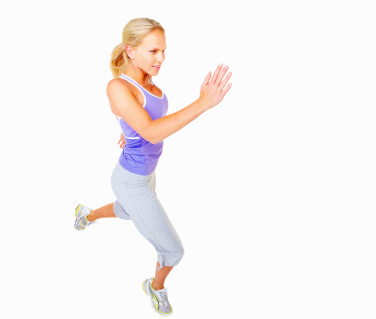Pain in Heel When Running
Common Causes, Treatment and Prevention Strategies
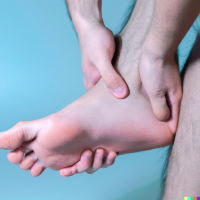
Pain in Heel When Running Issue #1 - Plantar Fasciitis
One of the most common causes of heel pain in runners is plantar fasciitis. This condition occurs when the thick band of tissue that connects your heel bone to your toes, known as the plantar fascia, becomes inflamed. It typically causes a stabbing pain that usually occurs with your first steps in the morning or after long periods of standing or sitting.
Self-Treatment Options
For plantar fasciitis, self-treatment options include rest, ice, and stretches. Temporarily reducing or stopping the activities that make your foot hurt will help ease the pain. Applying ice to the area for 15-20 minutes three to four times a day can also reduce inflammation.
Stretching and Strengthening Exercises
Stretching exercises can also help soothe the pain associated with plantar fasciitis. Exercises to stretch your plantar fascia and Achilles tendon and to strengthen your lower leg muscles can help stabilize your ankle and heel.
When to Visit a Doctor
If your pain persists for more than a few weeks despite self-treatment, you should consult a doctor. They may recommend physical therapy, night splints, or even custom-fitted arch supports (orthotics) to distribute pressure more evenly across your feet when you move.
Preventing Plantar Fasciitis
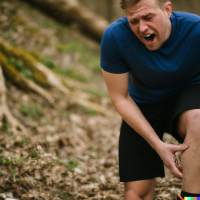
I have had my own experience with plantar fasciitis. It was back when I was an exchange student at Colorado State University, Fort Collins, Colorado. My schedule as an exchange student was light on, which gave me a lot of time for exercise, running particularly. I ran a lot. Even when summer turned into winter overnight. The student recreation centre had this nice elevated 200m indoor track and eventhough it made you feel a bit like a hamster, I'd dutifully run my laps on that track. Back then, I did not value running shoes as much as I do now. My student budget was probably also a factor! But yes, with heavily worn out shoes, I got myself plantar fasciitis. I remember persevering with my running for a while, but in the end, the only thing that really solved it was rest, ice and stretches... Luckily I did choose to stop running quite quickly and it did not become a more permanent / chronic issue.
Pain in Heel When Running Issue #2: Achilles Tendinitis
Another possible cause of heel pain when running is Achilles tendinitis. This condition occurs when the Achilles tendon, the large tendon at the back of your ankle, becomes irritated and inflamed. The pain associated with Achilles tendinitis typically begins as a mild ache in the back of the leg or above the heel after running or other sports activities.
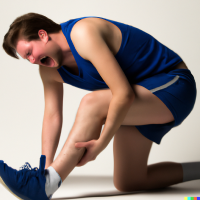
For self-treatment of Achilles tendinitis, rest, ice, and over-the-counter pain relievers can help. Resting and elevating your foot when you can and applying ice for 15-20 minutes after you run can reduce inflammation and pain. Over-the-counter pain relievers such as ibuprofen and naproxen can also help reduce the pain and inflammation.
Stretching and Strengthening Exercises
Strengthening and stretching exercises can also help with Achilles tendinitis. Calf stretches, heel drops, and other exercises that strengthen the calf muscles can help prevent further injury and alleviate pain.
When to Visit a Doctor
If your symptoms persist for more than a few weeks despite self-treatment, it's time to visit a doctor. They may recommend physical therapy, orthotic devices, or even surgery in severe cases.
Preventing Achilles Tendinitis
Preventing Achilles tendinitis involves several strategies. Gradually increasing your activity level, incorporating strength training into your routine, and wearing appropriate footwear can all help. It's also important to stretch your calves and Achilles tendon before and after running.
The few times my Achilles has become enflamed has pretty much solely been when I was ramping up my mileage too aggressively. The key to it being a small issue and not letting it grow into something bigger is to back off and take more rest days. That's always been my approach. Better to take a few days off now, than being not able to run for weeks or months!
Pain in Heel When Running - Other Issues
Other causes of heel pain when running can include heel spurs, stress fractures, or bursitis. Each of these conditions will have different self-treatment options, prevention methods, and indications for when to seek medical advice.
Pain in Heel When Running Issue #3 - Heel Spurs
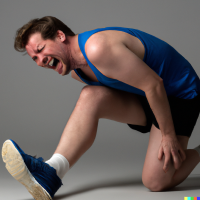
Preventing heel spurs involves maintaining a healthy weight, wearing shoes that fit well and provide adequate support, and regularly stretching your plantar fascia and Achilles tendon.
Pain in Heel When Running Issue #4 - Stress Fractures
Stress fractures are tiny breaks in the bone. They often occur in the heel bone after too much weight-bearing activity, like running. Rest is the main treatment option, but if pain persists, you should see a doctor. Prevention involves gradually increasing your running or walking distance and wearing supportive footwear.
Pain in Heel When Running Issue #5 - Bursitis
Bursitis is inflammation of the small fluid-filled sacs (bursae) that cushion the bones, tendons, and muscles near your joints. Rest, ice, and over-the-counter pain medications can help relieve symptoms. If pain persists, a doctor may recommend physical therapy or corticosteroid injections.Preventing bursitis involves proper conditioning, stretching before and after exercising, and wearing appropriate footwear. It's also important to avoid activities that aggravate the condition.
Remember, heel pain after running should not be ignored. It's your body's way of telling you that something is wrong. Running with heel pain can lead to more serious injuries if not addressed.
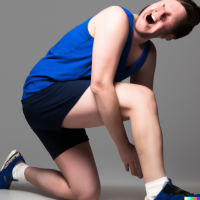
But if issues persist, it's crucial to visit a doctor at an early stage. Especially when there is excessive bruising or swelling, when the pain is so bad you can't do weight-bearing activities, when there are signs of infection, if you get a fever or if your pain simply persists or worsens despite rest. Your medical professional can provide a proper diagnosis and treatment plan to help you get back on track.
In conclusion, heel pain when running can be caused by various conditions, each with their own treatment options and prevention methods. Understanding these can help you manage and prevent pain, ensuring that you can continue to enjoy running safely and comfortably.
Also read the following short article about Foot and Ankle Strengthening to get some ideas on how to improve foot stability, which can help prevent heel pain and foot problems.
Home > Running Injuries > Pain in Heel When Running


